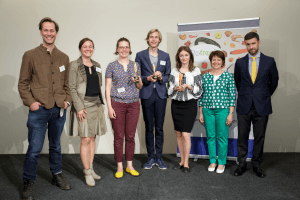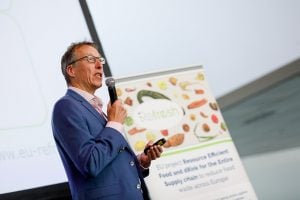
Article Contents
ReFresh, which stands for “Resource Efficient Food and dRink for the Entire Supply cHain”, was a research-driven project founded and active between 2015 and 2019, as part of the Horizon 2020. It is the major EU funded research project dedicated to taking action against food waste, lead by ir. AJM Toine Timmermans, Program Manager. It included 26 partners from 12 European countries and China who work and collaborate towards the reduction of avoidable waste and improved valorisation of food resources. With research focused on improved understanding of food waste drivers, the project propagates better decision-making by industry and individual consumers.
REFRESH Food Waste Solution Contest
One of the main goals of the ReFresh project was to design and develop technological innovations to improve valorisation of food waste, e.g. from food processing, and ICT-based platforms and tools to support new and existing solutions to reduce food waste. The first strategic initiatives towards this goal was the ReFresh Food Waste Solution Contest held in Spring 2017. The contest was proceeded by the ReFresh Food Waste 2017 Multi-stakeholder Conference in May 2017, in Berlin, Germany, where the CozZo team joined together with leaders in food waste prevention, reduction and valorisation.

The winners, nominated by public voting.
Still in its early stages of development, what the CozZo team presented in Berlin was a minimal viable product. Nevertheless, it’s potential was instantly recognized. CozZo was selected, from over fifty project submissions from across Europe, to be in the Finalists’shortlist to participate in voting for the Public Award.
But teaming with ReFresh, brought CozZo more than just public recognition. Far more important was the unique opportunity to further build the solution, based not just on gut feeling, but on the major breakthrough research in the field of consumer food waste. The study identified, not one, but a multiple food waste driver throughout the user journey all contributing consumer food binning.
Breakthrough Research in this Field of Consumer Food Waste
The major breakthrough in this field of consumer food waste research happened in 2016 with the publishing of the “Causes & Determinants of Consumers Food Waste A theoretical framework,” a report that was constructed by the Wageningen University.
This report presents a comprehensive theoretical framework on consumer food waste behaviours and focuses on the specific habits that increase the likelihood to waste, as well as the drivers behind these habits. In order to provide meaningful intervention for food waste reduction, technology should be designed and centred on tweaking exactly this behaviour, that leads to food waste and the drivers behind it.
Tech Intervention Based on Actual Consumer Behaviour and Waste Drivers
A design solution, be it technological or from the realm of public policy, is useless unless it is able to capture the heart of the problem it is trying to solve. If the design of the technology is accurately anticipating actual consumer behaviour and drivers, there is no reason that is should not work when it comes to tweaking food management habits.

Parallel session discussion on apps, designed to fight food waste. Ivo Dimitrov(CozZo), Jan Vogels(WIR), Oriol Domínguez (TGTG). Barcelona 2019.
A next-gen mobile and IoT solution, CozZo is designed specifically with such behaviour and drivers in mind, based on the findings of the aforementioned ReFresh report and extensive user feedback. Its purpose is to provide relief and assist on all the pain points outlined in the study, at its various stages, from planning, provisioning, storage, to preparation and consumption, so as to help households use the food they provision before it expires.
The interventions around which the CozZo.app is built have been summarised in a paper Turning ReFresh Consumer Behaviour Study into Effective Food Waste Tech Intervention, published on the ReFresh Community of Experts (COE) platform in December 2018.
REFRESH ICT Tools / Apps Testing
In the final stage of the ReFresh Project (June 2018-March 2019), CozZo.app was selected to be one of the 3 apps to take part in a focus group stuady designed to assess various ICT Tools and Apps in their ability to prevent consumer food waste. The project rolled out in the Summer of 2018 in the Netherlands. Although fully useable, at that point in time, CozZo still lacked some key features.
ReFresh Final Conference, April 2019, Barcelona
ICT Tools / Apps Test Findings

RefResh project was managed by Toine Timmermans.
The findings of the testing indicate that users show an open interest in trying out ICT Tool and Apps. They found most of the tested tools and apps to be primarily focused on planning and recipes. Thus, they do not perceive a clear need to invest the time, energy and stamina vs. the gained benefits. The explanation of this finding may lay in the fact, (as we have extensively written on the topic) that zealous meal planning can actually be causing food waste rather than preventing it.
During the ReFresh Final Conference, the Project Manager of the study, Jan Vogels, shared with Ivo Dimitrov, Founder and Chief Developer of CozZo, that their app was best received and appreciated during the testing. Users did, however, suggest some key improvements – quick start and onboarding, easy product entry and barcode scanning, and ability to join household members to collaborate in fighting food waste at home.
The good news? Well, meanwhile, over the last year, all of these improvements have become part of the CozZo.app design and collaborative experience. This learning that was also published on the ReFresh Community of Experts Platform.
From a Fear of Having too Little to a Concern of Having Too Much.
The ReFresh Final Conference had an important conclusion to make – the burning need to change the dominant social norm as a prerequisite to bringing about meaningful change. We don’t throw away food because we are bad people. We end up binning our food because we overestimate the amount of food, we can eat within a given time period before it goes bad. As Erica van Herpen, from Wageningen University, put it in her talk at the conference:
“People do not want to waste, it’s collateral damage. We need to change the social norm, from a fear of having too little to a concern about having too much.”
Our end note is: tech solutions work best when they go arm in arm with mindful consumer behaviour. We leave you with the geat video roundup from 2017 ReFresh conference.


Comments are closed, but trackbacks and pingbacks are open.